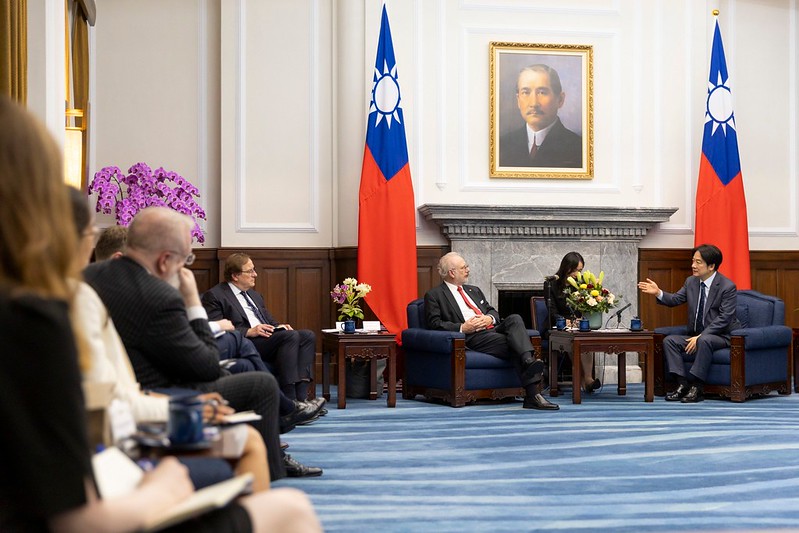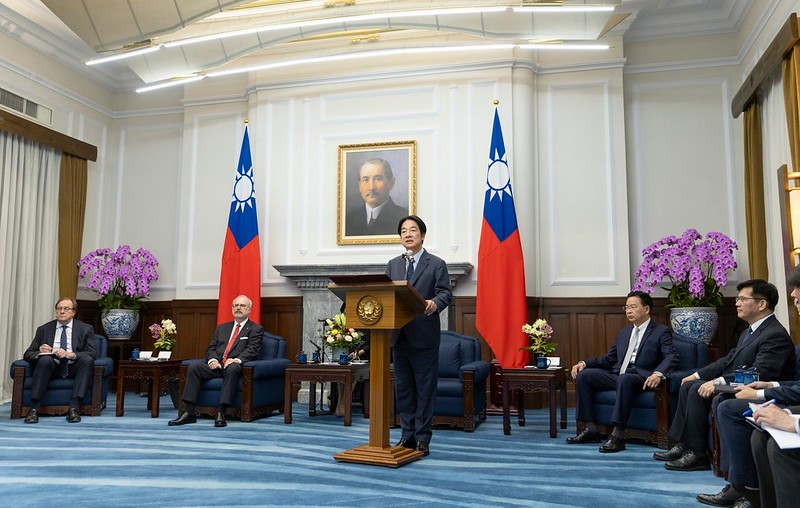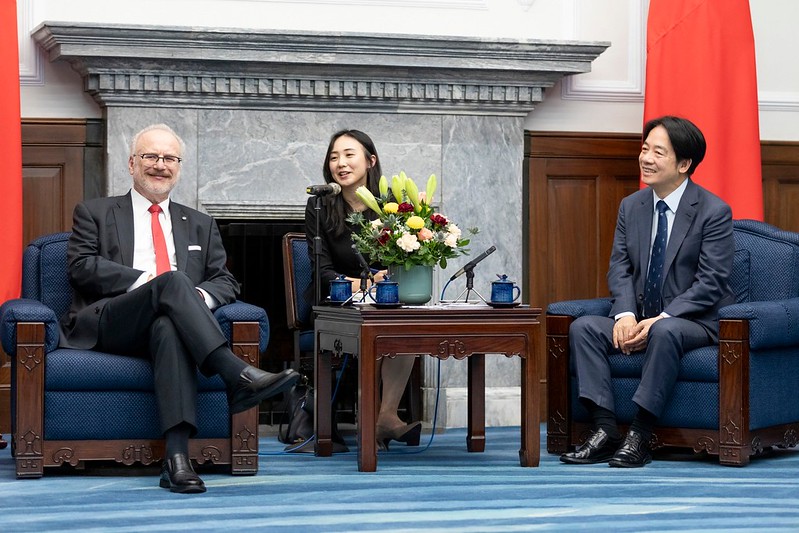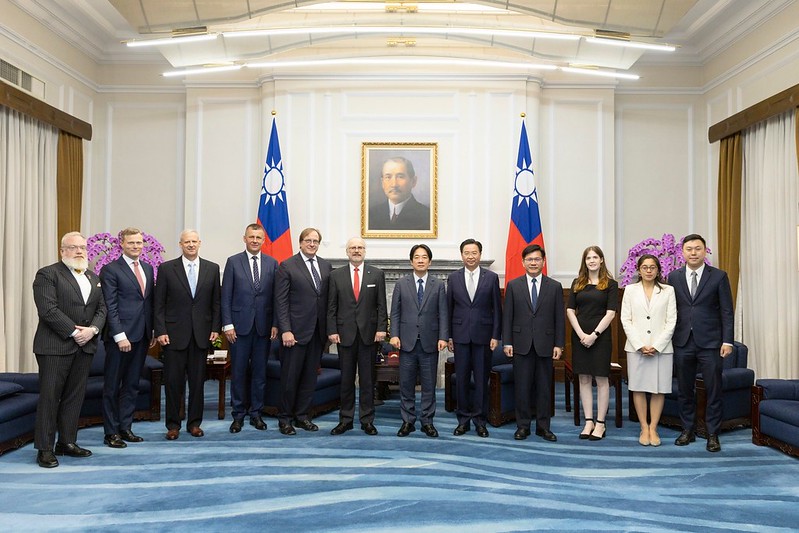News & activities
 News releases
News releases
On the morning of June 18, President Lai Ching-te met with a senior delegation from the Atlantic Council, a think tank based in Washington, DC. In remarks, President Lai thanked the delegation for coming, saying that their visit demonstrates transatlantic support for Taiwan. The president emphasized that democracies must work together to safeguard global peace and stability, and said that his administration will actively strengthen Taiwan’s partnerships with other democracies through values-based diplomacy in order to promote democracy, peace, and prosperity and enhance the welfare of our peoples.
A translation of President Lai’s remarks follows:
I extend a warm welcome to our esteemed guests from the United States, Latvia, and the Czech Republic. Thank you for coming to Taiwan. Your visit demonstrates transatlantic unity among democracies as well as support for Taiwan.
The Atlantic Council is one of the most influential think tanks in Washington, DC. Its policy recommendations on international security and foreign affairs are highly regarded in the US and Europe. Our guests are all experts in issues of national security and global affairs. I hope that you will continue to offer valuable advice on Taiwan’s security and international participation.
Taiwan, the US, Latvia, and the Czech Republic all cherish the values of freedom and democracy. We also face the common challenge of expanding authoritarianism. We profoundly understand that democracies must work together to safeguard global peace and stability.
In the almost one month since I took office, I have met with delegations such as yours from around the world who have come to deepen cooperation with Taiwan. My administration will actively strengthen Taiwan’s partnerships with other democracies through values-based diplomacy in order to promote democracy, peace, and prosperity and enhance the welfare of our peoples.
Taiwan, the US, and Europe are important economic and trade partners. Moving forward, we hope to continue to develop and diversify our cooperation and exchanges through mechanisms such as the Taiwan-US Economic Prosperity Partnership Dialogue, the Taiwan-US Initiative on 21st-Century Trade, and the Taiwan-EU Trade and Investment Dialogue.
Once again, I express my heartfelt gratitude for your visit at such an important time, which will help further deepen Taiwan’s ties with the US and Europe. I look forward to exchanging views with you momentarily, and I wish you a smooth and successful trip.
Former President Egils Levits of the Republic of Latvia then delivered remarks, first congratulating President Lai on his election as president of the Republic of China. He said that President Lai is taking office at a very challenging time, adding that he thinks this is the most challenging time after the Second World War. But, he said, they are sure that the president and the Taiwanese people will manage this situation.
Pointing out that Taiwan is a member of the global family of democracies, Former President Levits said that it is very difficult to measure the quality of democracies from a methodological point of view. But so far as such indexes exist, he said, Taiwan is in the world’s top 10 by the quality of democracy. He noted that this fact contains two messages: one good message and one maybe not so good. The good message, he said, is that it is possible to establish a high quality of democracy in a relatively short time, which is a good message for all non-democratic states or societies. The not so good message, he said, is that even if our society, if our country has a longstanding and long history of democracy, it is not guaranteed for the future. So the backsliding of democracy, he said, which they are challenging in some European countries and other countries, is reality.
Former President Levits noted that our peoples, the Taiwanese people, American people, Czech people, and Latvian people, believe that democracy is the best form of government. Nevertheless, he said, only a minority of the states and a minority of the 8 billion people in the world are living in democracies. He said he believes that democracies, especially in the last decade, are under threat, under threat from inside and from outside: from outside from aggressive powers, and from inside, especially, by the rise of populism. Therefore, he said, it is necessary to strengthen democracy and to strengthen the resilience of democracy.
Former President Levits stated that democracy should be able to defend itself and mentioned the constitutional principle of self-defending democracy, which he said in Anglo American Political Science is called militant democracy. He added that this principle of self-defending of militant democracy should be strengthened and should be adapted to the new threats; new threats, especially through hybrid war, through informational wars, and through cognitive war.
Remarking that Taiwan’s democracy is strong and resilient, despite the particularly complicated circumstances, Former President Levits said that the delegation of the Atlantic Council is therefore keen to exchange views and to hear from President Lai about the situation in Taiwan and around Taiwan, in order to share experiences with him and learn from him how to be resilient.
Atlantic Council President and Chief Executive Officer Frederick Kempe then delivered remarks. He congratulated President Lai on his recent election and inauguration as Taiwan’s 16th-term president, adding that the outcome was a testament to Taiwan’s robust and resilient democracy.
President Kempe remarked that President Lai’s inaugural address was wise and inspiring, noting that in it he correctly called Taiwan a global beacon for democracy, underscored the Four Pillars of Peace action plan and – importantly – the Four Commitments, and provided a vision for Taiwan as an artificial intelligence island, as well as a silicon island. He said he thinks that these are islands we would all like to invest in.
President Kempe said that the Atlantic Council last November brought a delegation of 25 next-generation global leaders, impressive individuals from all over the world, who met former President Tsai Ing-wen. They wanted to introduce them to Taiwan, he said, and they came away from the visit impressed by the creativity, the resilience, the energy, and the dynamism of our country and the Taiwanese people.
Mentioning that the Atlantic Council is called a think tank, President Kempe said that they think of themselves as an action tank, adding that one of the actions they want to take is to build upon the relations they created then, between their next generation of global leaders and our impressive next generation of Taiwanese leaders. He recalled that his first trip here was as a young Wall Street Journal reporter in 1988, when he interviewed a new president at that time, Lee Teng-hui, Taiwan’s fourth president, the first to be directly elected, who was credited for overseeing the end of martial law and the full democratization of the Republic of China. The country he sees today, he emphasized, compared to what he experienced then, is much more deeply democratic, much more deeply successful economically, with more than seven times the GDP of that time, and much more advanced technologically. Back then, he pointed out, no one had heard of TSMC, which had been born only a year earlier in 1987, and he knows how much the president had to do with where TSMC has come since then.
President Kempe said that President Lai, as the son of a coal miner and then a trained physician, knows about hard work and about health, and that he has been elected as a person of the people to defend and advance the accomplishments that he has talked about in the country in the face of historic headwinds regionally and globally. He said they appreciate the long and deep relationship between Taiwan and the Atlantic Council as we work together to execute our mission of shaping the global future together.
President Kempe said that it is worth remembering that Latvia only became an independent democracy in August of 1991, and only through the Velvet Revolution of 1989 did Czechoslovakia and the Czech Republic land on this path. Young democracies, he said, understand where we are, and their delegation is a symbol of transatlantic support for our democracy.
President Kempe said that in this year of 2024, we face the greatest threats to the global system since the 1930s, and that this all occurs against the background of an evolution of a new confederation of autocracies, as China, Russia, North Korea, and Iran are working more closely together on defense, industrial, and geopolitical collaboration than ever before. President Vladimir Putin’s visit to North Korea today, he emphasized, is a dramatic reminder of that fact. He said that there is really only one answer to that, and that is to look optimistically to the future in common cause, and through deterrence, resilience, vigilance, and common cause. He then quoted from President Lai’s inauguration speech: “China’s military actions and gray-zone coercion are considered the greatest strategic challenges to global peace and stability,” saying that that was such a wise way of putting it, because over the last 18 months, we have seen a growing intensity of Chinese gray-zone activities against Taiwan that work together, and not apart from, military activities, and that both must be addressed and deterred.
President Kempe said he is optimistic about US and transatlantic leadership alongside their allies in this region, and their most important security partners like Taiwan, over the medium and long term, but that he is concerned about the short term. In that respect, he closed with a couple of thoughts on Taiwan and Ukraine and why the security of both is interconnected. Failing in one theater, he said, will only feed failure in the other, and success in Ukraine will help ensure success here. He emphasized that arguing that we should separate them misunderstands how China and Russia view them.
Stating that President Lai is leading Taiwan at one of the more volatile geopolitical moments in our lifetimes, President Kempe said he has seen the strengthening of our country’s democracy and prosperity since his first trip here in 1988 and that there is no reason to think it will not continue and grow under President Lai’s leadership. We live in a moment certainly of maximum danger, he remarked, and we also live in a moment of maximum opportunity. He pointed out that we are entering potentially one of the most promising periods of human history of technological, ecological, healthcare, and democratic progress, and that working together, we can navigate the dangers and seize the opportunities.
The delegation also included former Minister of Foreign Affairs of the Czech Republic Tomáš Petříček and former Director of the US Defense Intelligence Agency Scott D. Berrier.












